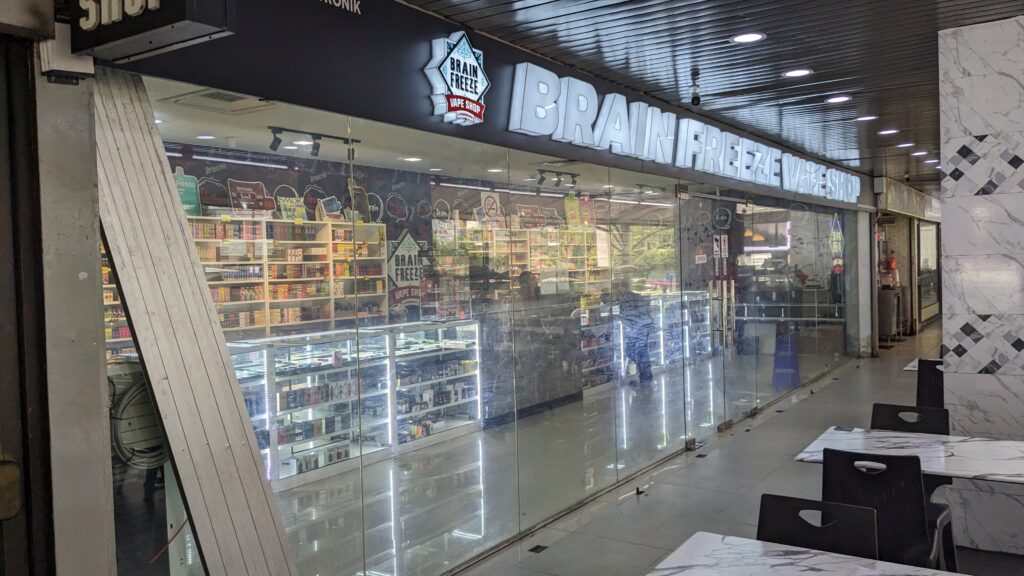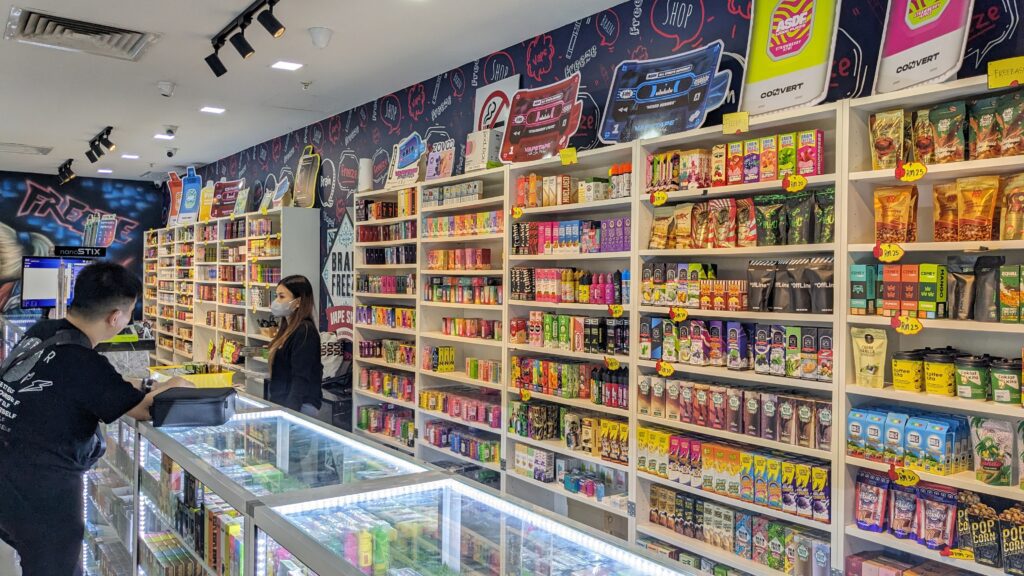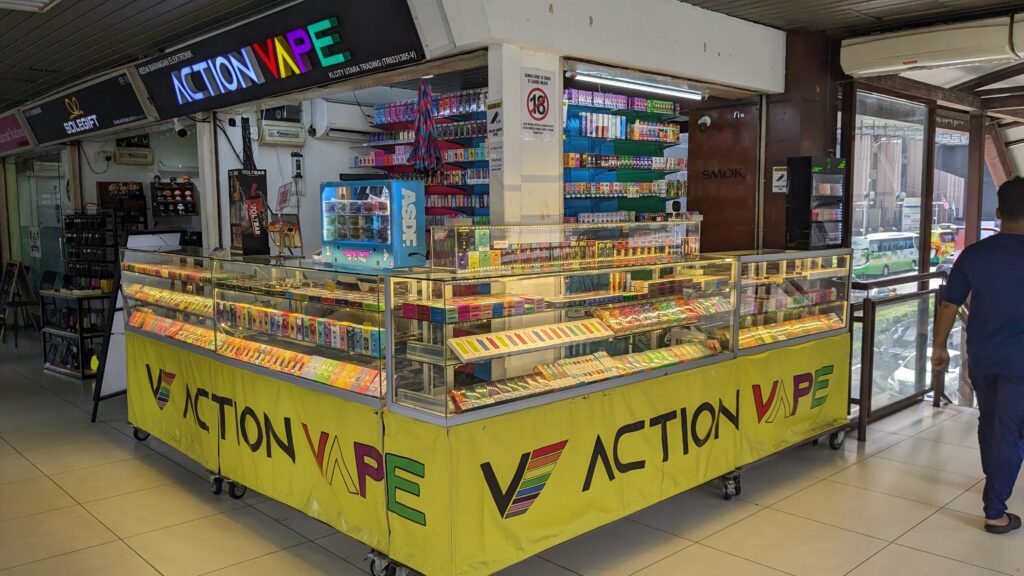
It remains to be seen whether Malaysia will remain as tolerant of vaping as it is today.
By Norm Bour
Over the past four months, I have been in four different Asian countries. Each has its own currency, language, food and culture. They also all have their own vape markets, which differ based on regulations, cost of purchase (compared to income) and, in many cases, religious restrictions.
In Malaysia, my current homestay, the dominant religion is Islam, and I have seen more women wearing hajibs than in previously visited countries. What is fascinating is the exceptionally high number of young female vapers walking in the malls and on the streets. In a country so devout, I asked a vape shop clerks how religious leaders feel about vaping, especially among women.
“Cigarette and tobacco usage is very high within the Muslim community,” said one of the counter girls from Vape VG, which is located in a mall. “And even though most of us realize it’s an unhealthy habit, there is no opinion on it from our religious leaders.” She did not address the female perspective.
When I followed up and asked her which were the most popular products, she said (as many shopkeepers globally do), “flavors of all kinds, especially fruity [ones].”
I asked a group of several female vapers if they felt out of place or self-conscious about vaping in public or even in private. They said they had no problem doing it on the streets, but some felt uncomfortable doing it in their parents’ presence—even if their parents smoked.
Regardless, there is still a strong motivation in the country to increase tobacco taxation. In its February 2024 budget meeting, the government proposed to impose an excise duty on liquids or gels containing nicotine used for e-cigarettes or vaping devices—but that is as far as it got.
And Malaysia’s current excise duty on e-cigs and liquids with nicotine applies to just a few manufacturers. Meanwhile, the taxation on traditional cigarettes has not changed since 2017.
So far, the vape market in Malaysia is prolific and in the open. You don’t need to go very far to find a vape shop. Ironically, we saw more vape shops than tobacco stores, as my wife had difficulty finding the clove cigarettes she enjoys sometimes. The vape stores range from tiny kiosks, like Action Vape, within the walkways connecting buildings to small units of just a few square feet to the larger outlets, like Brain Freeze Vape, which claims to be the largest in the country.
With a population of just under 2 million, Malaysia’s capital, Kuala Lumpur, provides valuable insights into the country’s vaping market.
Considering that vaping is banned in neighboring Thailand, Singapore and Brunei, plus nearby Cambodia and Laos, it’s refreshing to see an open market. One shop owner confirmed that his store gets a lot of tourists from abroad, especially from countries where vaping is outlawed.
Malaysia, too, came close to banning vapes under its “Generational Endgame” bill. Proposed in 2022, this legislation would have prohibited anyone born in 2007 or later from buying and using cigarettes or vaping products in Malaysia, in effect gradually raising the legal age until it covered the entire population. The bill never passed, however; it was abandoned in November 2023, officially due to concerns about its constitutionality. Critics, however, blamed the U-turn on industry lobbying.
With that said, Malaysia still restricts underage sales. The law prohibits sales to those under the age of 18, but loopholes make that restriction toothless, according to critics. Health advocates complain that leading tobacco companies such Philip Morris International, BAT and Japan Tobacco International wield considerable influence in Malaysia.
Last year, the government exempted liquid nicotine and gels from its Poisons Act, effectively legalizing vaping as of last April. The move angered many people. Currently, the Control of Smoking Products for Public Health Bill 2023 prohibits the advertising and sponsorship of e-cigarettes or vape products.
Many businesses see potential in the Malaysian vaping market. At the end of March, Airscream U.K. announced plans to invest myr100 million ($21.12 million) in its operations over the next five years and move its headquarters to Malaysia, according to media reports. The company has already established administrative, sales and marketing operations and a showroom in Shah Alam. It has close to 40 employees locally and 100 globally.
Airscream founder and CEO Sam Ong cited a robust market and vaping industry ecosystem as reasons for the company’s decision. Over the past decade, Malaysia’s vaping industry has grown into a myr3 billion business, employing more than 30,000 Malaysians, according to the Malaysian Vape Chamber of Commerce.
Ong believes the market is poised for further growth, potentially driving more foreign direct investments into the country and bolstering job creation. “We are also encouraged by the passing of the Control of Smoking Products for Public Health Bill 2023, which brings Malaysia on par with other countries around the world, including the U.K., Australia, Thailand and Singapore, which have standalone legislation on tobacco and vape,” Ong said.
Additionally, China-based Ispire Technology received ISO9001: 2015 Quality Management System, ISO14001: 2015 Environmental Management System and ISO13485: 2016 Quality Management System Medical Device certifications for its 31,000-square-foot manufacturing facility in Malaysia earlier this year. Company leadership announced previously that Malaysia offers more business-friendly tariff rules than some other Asian countries.
“Earning three ISO certifications at our Malaysian manufacturing facility is a testament to our team’s ability to quickly bring the facility up to some of the highest standards in the industry, allowing us to expand our gross margins, geopolitically de-risk our production and service other businesses who need manufacturing for their vape hardware,” said Ispire’s Co-CEO, Michael Wang. “As the facility ramps up production, our gross margin is expected to increase due to the lack of a tariff when assembling products in Malaysia and then shipping them to the U.S.
“This is in contrast to the 25 percent tariff incurred when shipping finished products from China.”
The vaping and smoking trends in Malaysia seem contrary to those in many other countries. E-cigarette use among Malaysian youths aged 13–17 rose from 9.8 percent in 2017 to 14.9 percent in 2022, according to the National Health and Morbidity Survey. During the same period, cigarette smoking rates dropped from 13.8 percent to 6.2 percent.
With organizations such as the Southeast Asia Tobacco Control Alliance pressuring countries in the region to crack down on vaping, it remains to be seen whether Malaysia will remain as tolerant of vaping as it is today.
Norm Bour is the founder of VapeMentors and works with vape businesses worldwide. He can be reached at norm@VapeMentors.com.

